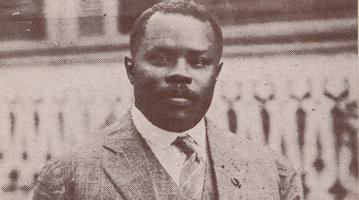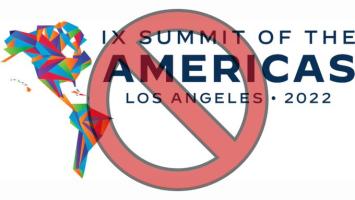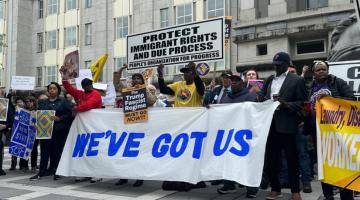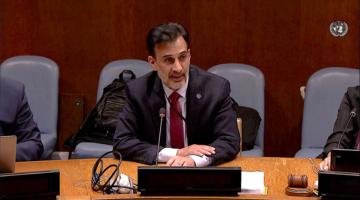Kamala Harris can be the object of derision for her word salads and oddly nervous laughter. But she plays an important role in promoting US imperialism and the cynical politics of representation.
Originally published in Hood Communist.
Kamala Harris wants to be your aunty. The Biden Administration’s controversial Vice President is often presented as either an incompetent sidekick, or a lovable big sister figure who “stays with her hair done”. Usually when she is presented to the general public it’s a roast— right wing media highlighting her latest string of incoherent thoughts or social media unloading a fresh set of cop memes. In February, The New York Times published the headline, “Kamala Harris Is Trying to Define Her Vice Presidency. Even Her Allies Are Tired of Waiting.” In the piece, John Morgan, a prominent fund-raiser for the Democratic Party, says, “I can’t think of one thing she’s done except stay out of the way and stand beside him at certain ceremonies.”
In December, a young Black Tik Toker uploaded a video explaining how her mom helped her to see that Harris’ infamous bouts of maniacal laughter aren’t actually a joke, but rather a serious act of “combatting the angry Black woman stereotype.”
“If you think about it”, the TikToker who goes by Jackie said, “I’ve never seen Kamala Harris upset or not smiling. And now when I see the jokes, they’re not funny… they’re weird.” The video garnered almost 400,000 likes, with over 3,800 comments largely sharing the same sentiment. In June this year, Harris sat down with actress Keke Palmer in an interview for her podcast Baby, This is Keke Palmer on Apple. Social media was ablaze with a viral moment from the interview where Palmer formally gets to ask Harris the most pressing question about her online today: “How many times a month do you get a silk press?”
But in between the inappropriate fits of laughter and drunkenly slurred vice presidential ramblings, there is more than meets the silk press. Kamala Harris isn’t just aimlessly walking, or laughing, or posing for photos. She’s not being shoved in some backroom and having her contributions devalued as a Black woman, as many also claim. What Kamala Harris is up to is actually way more sinister, for few people know about the quietly destructive role she’s been playing in Latin America and the Caribbean.
As Hood Communist Editor Erica Caines has previously written, in March of 2021 the White House announced that Harris would take charge of the Biden administration’s “efforts to deter migration to the southwestern border by working to improve conditions in Central America.” From the jump, Harris was assigned the border crisis beat, a role the “top cop” took on enthusiastically. And to date, the administration has been able to tackle its issue of bodies at the border, but not through resolving any particular conditions in Central America, but instead through some good ol’ “law and order”, a Harris speciality.
The administration introduced a new asylum ban that “bars some migrants from applying for asylum if they cross the border illegally or fail to first apply for safe harbor while crossing through another country on the way to the U.S.” Many immigration advocates compare this new ban to the Trump-era transit ban, noting that a huge deterrent for migrants to even attempt border crossing is their potential removal under Title 8, which “bans those migrants from the country for five years.” It’s important here to note that this migration is all a side effect of U.S. meddling in the politics and economics of its southern neighbors, a task that Miss Silk Press herself has become the face of. The plan is certainly “working as intended.”
The Devil Is In The Details
To better understand Harris’ complicity in U.S. imperialism in the Caribbean, you can look to the recently released “New Initiatives to Strengthen U.S-Caribbean Partnership” announced in June 2023. Since April 2022, Harris has been meeting with Caribbean leaders ostensibly to tackle issues like firearms trafficking and combating climate change in the region. Sounds innocent enough, right? Well, maybe on the surface; a close look at these proposed plans, however, reveals the same kind of menacing plotting that the U.S. has used against the Caribbean since the establishment of the Monroe Doctrine.
Militarization
Using the Western created social, political, and economic crisis in Haiti as a launching pad, this new “partnership” begins by outlining plans to heavily militarize and train law enforcement across the Caribbean in order to stem the flow of illegal guns and gun violence. But who sends firearms to Haiti in the first place? Even the U.S. Department of Homeland Security and the United Nations have admitted that the chief source of arms is the United States. So if the overwhelming number of guns trafficked to Haiti originate from the US, then how confident should anyone be that the U.S. is capable of asserting itself as a legitimate intervening authority? In essence, millions of dollars will be spent on guns and military infrastructure, in order to stop the guns and over-militarization on behalf of the benefactor of the guns and militarization, with the idea that this same entity will be responsible for policing itself. It’s a lot like that one spiderman meme.
¢hange 4 Regime Change
The plan goes on to allocate almost $65 million through the U.S. Agency for International Development, also known as USAID, in food and agricultural assistance. But most people familiar with USAID should know that USAID doesn’t actually feed people. It feeds institutions, like the National Endowment for Democracy (NED). The NED is best known for its regime change efforts around the world— from Korea, to China, to Cuba, to Ukraine, to Bolivia, to Nicaragua, to Venezuela. NED was present in Haiti for the violent coup which toppled the democratically elected President Jean-Bertrand Aristide in 2004 . Anywhere there is a color revolution to be had, or social contradictions to be exploited, you will find USAID and the NED.
The plan also tosses in support of an extension on the Haitian Economic Lift Program (HELP), which is key US policy that helps clothing manufacturers like New Balance and Wal-Mart exploit Haitian garment workers. Through HELP, the U.S. brags that Haiti’s textile industry is among the country’s “largest private sector employers,” but the nature of that employment is extremely contentious. “Private sector employers” is the euphemism, “sweatshops” has been the reality.
In 2011, Wikileaks discovered that the U.S. Embassy in Haiti worked “closely with factory owners contracted by Levi’s, Hanes, and Fruit of the Loom to aggressively block a paltry minimum wage increase.” Haitian workers regularly take to the streets in demand of better working conditions, streets which in the future will become less safe to strike in thanks to the enhanced militarization of Haitian police and foreign military presence attached to Kamala’s plan.
Climate Cata$trophe
The disingenuous proposals continue with Harris’ plans to tackle climate change in the region. These plans don’t actually speak to the root causes of climate change. They don’t address militarization, like the annual SOUTHCOM-sponsored ground, air, sea, and cyber exercise known as Tradewinds. The plan also doesn’t address exploitation in the form of resource extraction on behalf of U.S. megacorporations like Exxon, which has embarked on an off-shore drilling project so large in Guyana that it could spill “oil to the beaches of 14 different Caribbean islands, most of which depend on fishing and tourism.” Instead, roughly $26 million will be given to U.S.-based NGOs and nonprofits to “catalyze climate related business in the Caribbean.” This has historically only resulted in the construction of bandaids on top of gaping wounds.
Take for instance the Rocky Mountain Institute (RMI) in Colorado, an example of a private think tank that has been the beneficiary of these kinds of government funds. In 2019, category five Hurricane Dorian battered northern Bahamas. RMI wrote a proposal to receive funding to construct a solar microgrid in a location called Ragged Island. Since this initial construction, RMI has been featured on CBS 60 Minutes and praised throughout western hemisphere media for this alleged innovation. The reality of this investment however, is that Ragged Island has less than 72 inhabitants and almost all of them are the children of the wealthy white settlers who settled it in the 19th century. Even if a microgrid was a salient response to military carbon footprint or offshore drilling, what of the other Bahamians, the Black ones, the 92% who are set to become the next victims of Exxon? Through U.S. imposed austerity measures, the Caribbean is ripe for exploitation by nonprofits and NGOs who flock there to each other’s backs. Austerity in Puerto Rico, opened the door for RMI to take its microgrid technology into schools damaged by hurricanes and collaborate with education non-profits like Save The Children to rebuild them, providing “roof waterproofing, energy efficiency retrofits such as LED lighting, and curriculum support for teachers.” In this sense, the microgrids act as a trojan horse for privatizing education. The U.S., who is supposed to, doesn’t rebuild public schools in Puerto Rico, so an NGO like RMI can swoop in and rebuild them. The schools can then be transformed into private or charter schools with USAID sponsored curriculum.
Life and Debt
One of the worst parts of this plan are the debt traps. The announcement of these initiatives began a straight-up rebranding campaign on behalf of the International Monetary Fund (IMF) and The World Bank, the premier imperialist financial institutions of our day. Baked into the final pages of the proposal are phrases like “World Bank Evolution”, noting that the U.S. is urging financial institutions to “work with the needs of today’s developing countries”, but it’s painfully obvious that this campaign is not really about working in the best interests of the developing world.
Instead, it reeks of the desperate need to compete with China’s Belt and Road Initiative and the world’s growing interest in the BRICS economic bloc, in order to maintain its stronghold on one of the most economically subservient regions of the world. But this “evolution” of the World Bank and IMF does not once mention the words “loan forgiveness”, as China has done multiple times for its African and Caribbean partners.
Launched on the back of the continued destruction of Haiti, Harris’ plan is set to drag the entire Caribbean through endless cycles of economic slavery. Since the 1960s, Jamaica’s economy has been destroyed by these same financial institutions through corporate subsidies in the U.S. which undermine its local agriculture. The 2001 Stephanie Black documentary Life and Debt explored how the IMF gives loans to countries like Jamaica that are in economic trouble and in exchange, countries must implement a program of painful policy reforms known as structural adjustment. Countries rarely complete these programs. Structural adjustment in Jamaica allowed subsidized, U.S.-grown Idaho potatoes to bankrupt Jamaican potato farmers and McDonald’s to refuse to buy local meat. Now, according to Harris’ initiative, the Biden admin will work closely with Congress to lend $21 billion through the IMF, with $764 million of that allocated for Jamaica.
In January 2023, the United States supported a “$100 million International Bank for Reconstruction and Development loan” to Barbados. This likely explains why Mia Mottley, the Prime Minister of Barbados, recently took the stage at the Global Citizens Festival in Paris alongside World Bank President Ajay Banga in June. In her speech, she thanked President Emmanuel Macron of France for his support of the Global Financing Pact, which was immediately met by “boos” from the thousands of young Europeans in attendance. “My friends trust me, I want you to know,” she repeated, “that the one person in the G7 who has stood up for the planet has been President Macron.” Banga followed her remarks by adding that “[Developing countries] should feel the hand of the World Bank on their back, not in their face.” Harris’ plan will ensure that what Caribbean nations feel is more like a slap in either direction.
Conclusion
Kamala Harris’ identities as a Black woman and Jamaican continue to be used against the masses of African people around the world, who are told we should be thankful for the representation. This is a vicious tactic of neo-colonialism and it was outlined for us by Kwame Nkrumah in 1965, when he explained that: “Neo-colonialism is also the worst form of imperialism. For those who practise it, it means power without responsibility and for those who suffer from it, it means exploitation without redress.”
As the people of the Caribbean continue to fight for sovereignty, we must be careful of these narratives which have gone a long way to infantilize one of the most powerful people in the world, and that ultimately just let U.S. imperialism off the hook because we like its hair. Kamala Harris wants to be your aunty. She wants you to hear her “skeewee” and see her in her Converse sneakers and “see yourself”, or at least an image of what you could be. But now is the time for us to break with the sentimentality of representation so that we may see Kamala Harris for who she truly is. Kamala Harris isn’t your aunty, she’s an imperialist.
Salifu Mack is a Pan-Africanist and organizer with the All-African People's Revolutionary Party and the Lowcountry Action Committee in the Lowcountry of South Carolina.



















